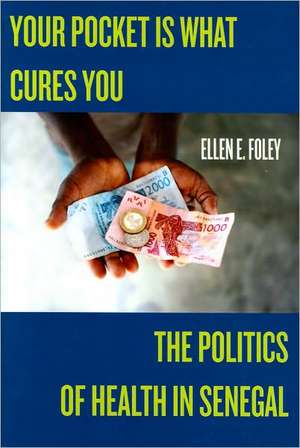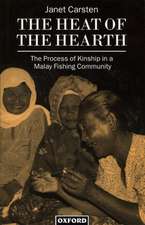Your Pocket Is What Cures You: The Politics of Health in Senegal: Studies in Medical Anthropology
Autor Dr. Ellen E Foleyen Limba Engleză Paperback – 3 dec 2009
In the wake of structural adjustment programs in the 1980s and health reforms in the 1990s, the majority of sub-Saharan African governments spend less than ten dollars per capita on health annually, and many Africans have limited access to basic medical care. Using a community-level approach, anthropologist Ellen E. Foley analyzes the implementation of global health policies and how they become intertwined with existing social and political inequalities in Senegal. Your Pocket Is What Cures You examines qualitative shifts in health and healing spurred by these reforms, and analyzes the dilemmas they create for health professionals and patients alike. It also explores how cultural frameworks, particularly those stemming from Islam and Wolof ethnomedicine, are central to understanding how people manage vulnerability to ill health.
While offering a critique of neoliberal health policies, Your Pocket Is What Cures You remains grounded in ethnography to highlight the struggles of men and women who are precariously balanced on twin precipices of crumbling health systems and economic decline. Their stories demonstrate what happens when market-based health reforms collide with material, political, and social realities in African societies.
| Toate formatele și edițiile | Preț | Express |
|---|---|---|
| Paperback (1) | 304.82 lei 6-8 săpt. | |
| Rutgers University Press – 3 dec 2009 | 304.82 lei 6-8 săpt. | |
| Hardback (1) | 825.45 lei 6-8 săpt. | |
| Rutgers University Press – 3 dec 2009 | 825.45 lei 6-8 săpt. |
Din seria Studies in Medical Anthropology
-
 Preț: 323.22 lei
Preț: 323.22 lei -
 Preț: 286.52 lei
Preț: 286.52 lei -
 Preț: 316.16 lei
Preț: 316.16 lei -
 Preț: 313.73 lei
Preț: 313.73 lei -
 Preț: 307.48 lei
Preț: 307.48 lei -
 Preț: 314.50 lei
Preț: 314.50 lei -
 Preț: 288.59 lei
Preț: 288.59 lei -
 Preț: 332.77 lei
Preț: 332.77 lei - 20%
 Preț: 191.44 lei
Preț: 191.44 lei - 32%
 Preț: 216.74 lei
Preț: 216.74 lei - 21%
 Preț: 232.00 lei
Preț: 232.00 lei - 20%
 Preț: 253.66 lei
Preț: 253.66 lei - 37%
 Preț: 184.99 lei
Preț: 184.99 lei - 30%
 Preț: 178.94 lei
Preț: 178.94 lei - 28%
 Preț: 191.97 lei
Preț: 191.97 lei - 21%
 Preț: 231.42 lei
Preț: 231.42 lei
Preț: 304.82 lei
Nou
Puncte Express: 457
Preț estimativ în valută:
58.33€ • 61.34$ • 48.20£
58.33€ • 61.34$ • 48.20£
Carte tipărită la comandă
Livrare economică 17 aprilie-01 mai
Preluare comenzi: 021 569.72.76
Specificații
ISBN-13: 9780813546681
ISBN-10: 0813546680
Pagini: 216
Ilustrații: 1
Dimensiuni: 152 x 229 x 15 mm
Greutate: 0.3 kg
Ediția:None
Editura: Rutgers University Press
Colecția Rutgers University Press
Seria Studies in Medical Anthropology
ISBN-10: 0813546680
Pagini: 216
Ilustrații: 1
Dimensiuni: 152 x 229 x 15 mm
Greutate: 0.3 kg
Ediția:None
Editura: Rutgers University Press
Colecția Rutgers University Press
Seria Studies in Medical Anthropology
Notă biografică
Ellen E. Foley is an assistant professor of international development and social change at Clark University
Descriere
In the wake of structural adjustment programs in the 1980s and health reforms in the 1990s, the majority of sub-Saharan African governments spend less than ten dollars per capita on health annually, and many Africans have limited access to basic medical care. Using a community-level approach, anthropologist Ellen E. Foley analyzes the implementation of global health policies and how they become intertwined with existing social and political inequalities in Senegal. Your Pocket Is What Cures You examines qualitative shifts in health and healing spurred by these reforms, and analyzes the dilemmas they create for health professionals and patients alike. It also explores how cultural frameworks, particularly those stemming from Islam and Wolof ethnomedicine, are central to understanding how people manage vulnerability to ill health.
While offering a critique of neoliberal health policies, Your Pocket Is What Cures You remains grounded in ethnography to highlight the struggles of men and women who are precariously balanced on twin precipices of crumbling health systems and economic decline. Their stories demonstrate what happens when market-based health reforms collide with material, political, and social realities in African societies.

















